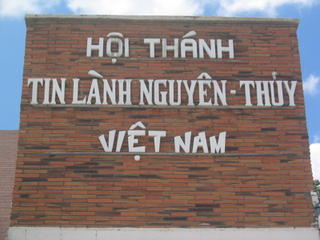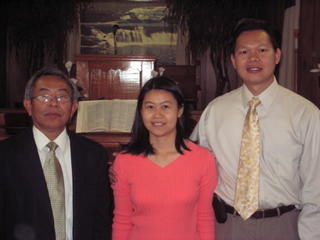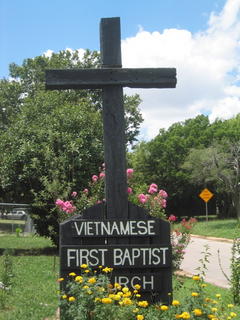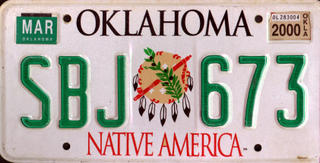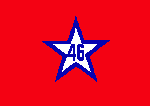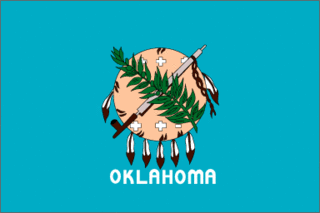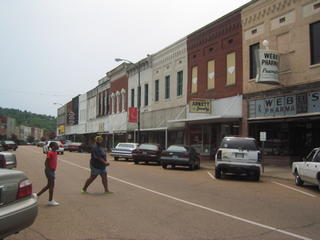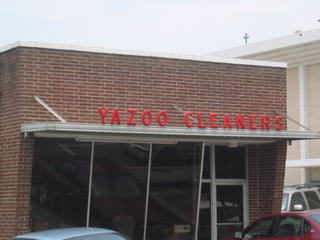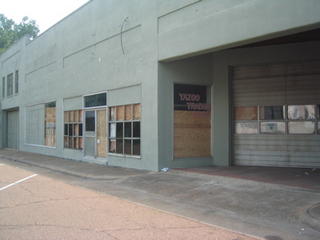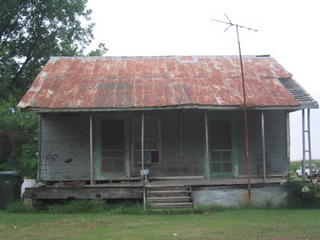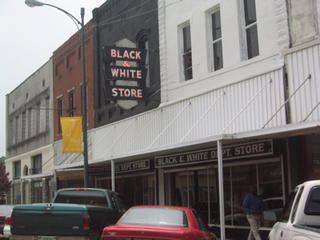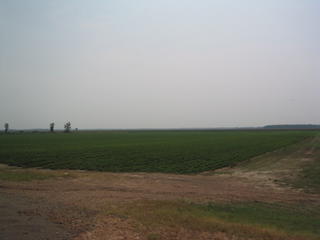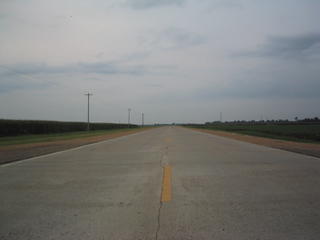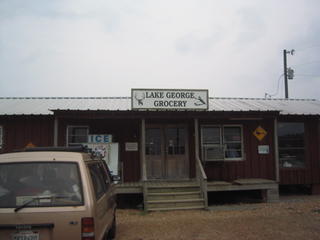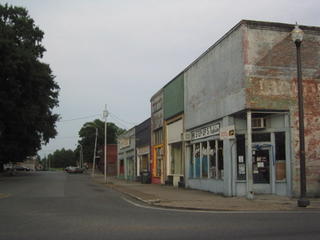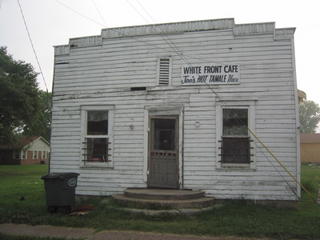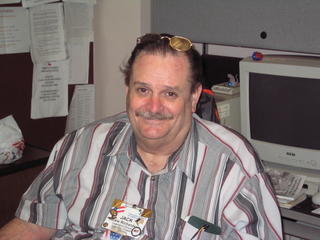Since we're in the middle of the Bible Belt, we've been spending most of our time interviewing Christians and going to Christian churches, which are on almost every corner in many areas of Oklahoma. One could easily overlook the fact that Oklahoma City is home to synagogues and mosques, as well as a Sikh and Hindu Temple. Barry Cohen is the Rabbi of
Temple B'nai Israel, a Reform Jewish congregation founded in 1903 in Oklahoma City. Temple B'nai Israel is co-sponsoring a forthcoming exhibit of the
Nazi persecution of the homosexual community and works with the local NAACP. Rabbi Cohen, 36, grew up in Memphis, Tennessee, and last worked in Scottsdale, Arizona as an assistant Rabbi at a reform congregation.
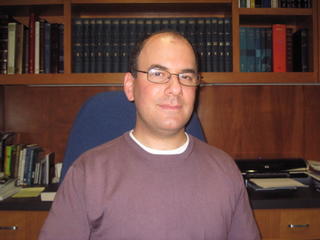 What brought you to Oklahoma City?
What brought you to Oklahoma City?When I was out in Arizona, I was a congregational rabbi for two years and then my career took a turn and I got into Jewish journalism. I was working at the Jewish News of Greater Phoenix for four years, but I missed a lot of aspects of the congregational world and I was concerned that the window was going to close eventually. There are only so many years you can be out until people look at you strange and say, where have you been? So it was time to get back in the game. I interviewed at a number of different places and this seemed to be a good place to get back into the congregational world. I've been here a little more than a year. My wife gave birth to twins seven months ago and we really feel like we've been welcomed into the community. Temple B'nai Israel is like a ready set community. We made a set of friends pretty easily. They've been very welcoming without being hovering or trying to be too intrusive. Even though I've only been here for a little over a year, in many ways it feels like a lot longer as far as comfort level. It's such a contrast to Phoenix where it was difficult to make substantial friendships. The Jewish community here has been here longer than the state has existed, so you have people here who can trace their family line back to the Land Run.
Tell me more about Oklahoma's Jewish community.Oh my goodness. I had no idea it had such deep roots. It really goes back to the Land Run, if not even before. Most settled in Eastern Oklahoma. Most of those Jewish communities have declined to the point of being non-existent and like almost every Jewish community, they move from the little town to the big city. The real concentration of Jewish communities are in Oklahoma City and Tulsa. There are a few isolated communities here and there, but it's impressive how families have come out here and stayed here for generations.
We've been on the road for about three months now and have gone to a lot of churches. The Christian way of life obviously gets the most attention. Do you work with Christians or have relationships with pastors?It's very clear when I was interviewing that they were looking for a rabbi who would be out in the community. In many ways, I'm taking over from the substantial work that my predecessor did. He built a strong connection with the African-American community, with a local Catholic Church and a local Unitarian Church. It's very important for there to be a Jewish face out in the community and even in the political community. With this being a state capitol, already just by virtue of being a Rabbi at this Temple, I was asked by a state representative to be the House Chaplain.
What I'm also finding at churches is that there are so many different flavors of Christianity. I've met progressive Christians who do outreach to the poor and the community at large. I've also met conservative Christians who spend a lot of money upgrading their buildings. Does that apply to the Jewish community here, in terms of people being both liberal and conservative?Within this congregation, it is clear that there are people here who are hardcore Democrats, hardcore Republicans, moderates, Libertarian, you get the whole gamut. That being said, there is a core group of people here that believe in getting out in the community. For example, every Christmas we work at Will Rogers Airport to give the employees -- the people who give out information -- the day off. We say, this is much more of an important day for you than it is for our community. There's another group that tutors within the public school system and is involved with a number of social action programs. Again, there is the need to take the teachings of Judaism and make them real so they don't just stay within the walls of this house of worship. You've got to express it out in the community or really you're just talking.
When you interviewed here, did politics come up?No. In many ways, politics, except for a minority of people I've gotten to be friends with, doesn't come up. I respect that. I'm not going to take an official political stand from the bima during one of my sermons. You can take a look at Judaism and be a Communist. You can look at Judaism and be a Libertarian. So you can take a look at the 4,000 years of Jewish history and find any political hook. I'm not about to try to say this is where Judaism stands on this issue because that's misusing the traditions and I don't want to alienate anybody. People haven't really put me on the spot and that's been refreshing.
And there's a conservative congregation in the area?Yes, Emmanuel Synagogue. They fall within conservative Judaism and there's a small Chabai presence.
So there are three in town?Yeah, and that's it. It's a small community of about 2500 Jews and we're all able to sit at the same table. There are families that belong to this congregation that have their primary membership at the temple, but have an associate membership at the synagogue or vice versa, so you have families that maybe grew up in the conservative synagogue and a few generations later, gravitated here. We still view ourselves as a single community because it is small. A few years back, we combined the religious schools so the temple kids and the synagogue kids could interact. For years, if you grew up a youth in the temple, you barely even knew the people your age right down the road.
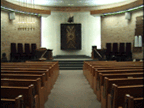 On this trip, we've been exposed to both liberal and conservative pastors. The liberal pastors say, if your neighbor is thirsty, give him or her a cup of water. Help the poor. Respect the environment. Celebrate life. The conservative pastors tend to focus on sinning, which makes you feel pretty awful. What about liberal and conservative Rabbis. What are the differences?
On this trip, we've been exposed to both liberal and conservative pastors. The liberal pastors say, if your neighbor is thirsty, give him or her a cup of water. Help the poor. Respect the environment. Celebrate life. The conservative pastors tend to focus on sinning, which makes you feel pretty awful. What about liberal and conservative Rabbis. What are the differences?That's a great question and it is getting harder and harder to define. In many ways, there are probably more similarities than there are differences. A generation ago, a more liberal Rabbi would not really be all that ritualistic, keeping kosher wasn't important, prayer is important, but community is more important. They would be much more willing to take strong political stances. Growing up in Memphis, they would be marching with African-American communities and be side by side with Martin Luther King. They would be at sit-ins. They would really be putting themselves at risk for religious principles. For better or for worse, there were some congregants who didn't like what they were doing and others were thrilled. Conservative Rabbis tended not to be as controversial. They were more ritualistic. Now it's harder to figure out, ok what's the difference? What's happening is the reform movement is becoming more conservative. My concern is that we're losing a bit of that social action tug. We're not so willing nowadays to take risks for the sake of politics, for the sake of the homeless, for the sake of the downtrodden and people who abuse drugs. Are we there for them? There's more of a push to what I call internal looking and spirituality, which is hard to define. So in that way, the reform movement is kind of veering back towards the center. Conservative Judaism hasn't changed as much, but what the conservative movement is facing is an internal shift. Some are becoming much more traditional, almost to the point of Orthodoxy and some are reacting to the world that's out there and becoming more liberal.
In terms of Oklahoma politics, one of the reasons we decided to come here is because John Kerry didn't win one county.Right. It's about as red as it gets.
What is your opinion of Oklahoma politics based on your experiences so far?It has been a slow and steady education. It's been a challenge to try to understand what is going on. The most confusing thing about Oklahoma politics from my perspective as a newcomer is that it is incredibly Republican when it comes to Presidential elections. Going back to World War II, the only Democratic presidents that this state has elected were Harry Truman and LBJ. That's it. Today there are more registered Democrats than there are registered Republicans. There is a sizable percentage of Independents, so it's a very strange situation because you may be a Republican running against a Democrat, but in reality it's a Republican running against a Republican, so it's been a challenge trying to figure that out. But that being the case, there is a definite group of strong liberal Democrats within the House and Seante. They know each other well, they share ideas and gravitate towards people in the community that support them. Even though I've only been out here a year, it's been easy to figure out the who's who and get in the game.
So do you consider yourself a liberal Democrat?It's all relative. Living in Arizona for six years, I would have said I was moderate to left, even by Arizona Republican standards. Moving out to Oklahoma, however, that moderate to left means I'm pretty left. That's reality. It's been fascinating. I don't feel like I've moved; I feel like the place I went to kind of shifted right. (laughs)
Have you had any tangible experiences here that made you wake up and say, I'm in a different place.Well, usually when you vote, you think it counts for something. I don't think one candidate I voted for, on a Presidential or statewide level, won. At that point, I was like, ok, I'm getting it. And something else that was eye opening happened when I was the House Chaplain for a week and gave a sermon. You work from Monday to Thursday and you're able to give a 10-minute sermon that Thursday morning. So I gave my sermon and I'm sure I gave them a read of the Scriptures that the majority of the people out there probably never heard before. The people that really agreed with me actually walked up and shook my hand and said, thank you for sharing your words. Then an individual came over and asked me to share some words with him out in the foyer. He spent the next 10 or 15 minutes preaching to me about how I was wrong and how if I didn't accept Jesus as Lord and Saviour, you knew where I was going. And this is an elected official. That was very eye opening. The person who sponsored me kind of rolled his eyes and said he knew that was coming. But he also let me know that he's not alone.
I've heard in the news about conservative Jews and conservative Christian fundamentalists coming together on issues concerning Israel, like the Dome of the Rock, but I noticed on this trip, that it's actually part of the culture. We were at a church in San Antonio that had more Israeli flags than the Israeli consulate in San Francisco. Have you seen that dynamic here?It is real. Absolutely. I've seen it more here listening to talk radio. I try to listen to a lot of talk radio just because I'm a huge fan of NPR, but I've got to balance that. There is a strong, strong advocacy within what I would call Christian fundamentalist groups, that are in many ways, more staunchly pro-Israel than some Jews are pro-Israel. This is the category of strange bedfellows. I don't know how deep the love of the Jewish people goes. I hate to sound cynical, but from what I've been able to learn, there is a need for as many Jews as possible to return to the land of Israel, to have control over every inch of Israel, if not expand upon those borders. That must take place in order for Jesus to return. I don't know how deep this love of Judaism goes because it's like a means to the end. That being the case, however, if there's going to be a strong relationship between the United States and Israel, which I want there to be, well, they vote and they want their elected officials to support Israel and to keep Israel safe and sound and have defensible borders. So how far do you go with building bridges into that community and when are you going to know when to stop and say, wait a minute, I can't go much further? And that's where we are right now. It's interesting seeing where the reform movement stands on reaching out to the Christian fundamentalists who are pro-Israel.
Is this something the reforms and conservatives agree on?Yes, because it's not really a question of Jewish ideology. In many ways, it's a question of, are you pro-Israel? And if you're pro-Israel, then how are we going to keep Israel safe and secure? This is the real blending of politics and religion.
Could you argue that their policies may not make Israel safe?Absolutely. The classic example right now is you have many people who are Christian Zionists who cannot stand the fact that Israel is planning to withdraw from the Gaza Strip. If you actually read the Scriptures, in many ways, Gaza has been a wild card ever since Gaza was Gaza. There's a misconception that it was Israel and is part of the "Promise Land." This is nothing new, so for people who think Gaza is the lifeblood of the Jewish people are wrong. There are very few Jews in Gaza and again, I'll show my political hand. To me, it is in the best interest of the state of Israel to get out of there. It's not even what I would call withdrawing. It's a question of saying, here's where the border is. We don't need to concern ourselves with protecting a Jewish Israeli minority. Now is the time for the Palestinian people to see if they can create a government. Can they govern themselves? Is it worth putting soldiers at risk? The Christian Zionists just do not understand it.
A lot of their attitudes towards issues like homosexuality are so influenced by lines they pull from Leviticus and the Old Testament as opposed to the Gospels. To me, it's called cherry picking. You can cherry pick any verse out of Scripture and take it out of historical and cultural context and prove anything you want to prove. To me, that's a complete misuse of Scriptures. If you are an individual against homosexual or lesbian lifestyle, so be it, however, if you want to pick a verse from Scripture to show that this is the word of God to prove your own personal ideology, well you've crossed that line. One of my recurring lines is you can pick a recurring verse from Scripture and in many ways, I wouldn't be alive today because you're supposed to take the insolent son outside of the gates of the city and stone him to death. I guarantee you that at one point in my life, I was an insolent son and I'm still here.
We heard a Baptist preacher in Indianola, Mississippi, scream from the pulpit: All Arabs are born to hate and kill Jews. I approached people after the service and asked them how they felt about that and most said, well, we don't know any Arabs. Matter of fact, we don't know many Jews. But the message was strong and loud. For those people who are hardcore Christians, I'll pass by them in a grocery store. When there's an event downtown, we'll walk by each other and nod, but unless I go out of my way to make a connection with a church, they'll be doing their thing and the Jewish community will be doing its thing. I've only been out here for a year, but so far, so good. I've had some families say their son or daughter has been pressured to convert by classmates, but that's a rare instance.
I interviewed a gay man the other day and he said, even though the gay marriage ban got a majority of the vote, most people follow the live and let live lifestyle here.On the one hand, it's been very refreshing meeting people in this community and on the other hand, a little confusing because I've never seen hospitality like this. I've never felt so welcomed by strangers. There's a real sense of community. My neighbors, when we were moving in, they brought over fresh baked cookies. I'm not making that up. Fresh baked cookies. But it goes beyond that. People have gone out of their way when I've been shopping to help me or to just schmooze: where are you from? Welcome to the community. But on the other hand, I think about the way people vote. I'm glad we're not talking about politics. I'm glad I really don't know where a lot of people stand on the acceptance of gays and lesbians or a woman's right to choose because I'm concerned that that hospitality may really break down, but like you said, it's live and let live. It's a fascinating paradox, but it works for some reason.
Where does the Reform Jewish Congregation stand on gay marriage?We support civil unions. Inevitably, we will debate, as a movement, gay and lesbian marriage. I'm sure people in the Congregation completely disagree, but they're not disagreeing with me, they're disagreeing with the movement. That said, as a Rabbi and the way I interpret the tradition, I don't see anything wrong with gay marriage.
Do you have gay and lesbian members?We do. We're very open to the gay and lesbian community. There are people that are part of the core membership and they make no bones about it. If they're that comfortable, then we're doing something right.
Is there anything within the movement that you disagree with?Like I said earlier, I think we're drifting from taking political stands. Join a movement, don't just write a check to deal with world hunger. Why don't you go down and see the face of hunger? Why don't you go work in the soup kitchen? Go even further than that and figure out how we can get rid of the need for soup kitchens. Why are people hungry? I'll freely admit that I'm not practicing what I preach. That's a goal of mine, to get more involved in the community.
On a personal level, what issues are most important to you?I'm concerned that the middle class is getting squeezed. There's a huge disparity between the haves and the have-nots and that is worrisome to me. The level of polarization based upon economics, but also the polarization politically is bothersome and there's no discussion. To me, democracy is that you have to reach across the aisle and take a look at very controversial subjects and somehow find consensus. Something else that worries me is apathy among voters. I don't know how much people believe in the system as we did in years past. I'm worried about where we get our information to make knowledgeable decisions. If it's all based upon local news or nightly news, we're in serious trouble. That's not thorough reporting; that's not in-depth reporting. We're in a situation where we're making tremendous decisions not only about the people in this country, but also on the world stage. Are we aware of what's really going on? It scares me sometimes to think that we're not a knowledgeable electorate; we're not an engaged electorate.
How does the Jewish community feel about the war?Few people have asked me what I think about it and I haven't asked many people what they think about it. What I've been able to gather, however, is that initially, not only here, but I would say in the greater Jewish community, there was a much greater willingness to pursue the war with Iraq. The Jewish community is in a very awkward situation because many of them are very liberal Democrats, but at the same time, they're very pro-Israel, so how do you walk that line with a Republican President that is pro-Israel? How do you remain true to your political beliefs and at the same time, act for a safe and secure Israel? How can you be against Bush, but pro-war? There were many people in the Jewish community who were in favor of the war against Iraq simply for the safety of Israel, but as we've found out more about the reasons for going to war and the way it's been handled, there's been a huge sense of confusion and dismay about it. We're in a huge mess now. Every single reason up to this point has fallen to the wayside, including the democracy argument. I just read that according to the proposed Iraqi constitution, women's rights are being rolled back. Women had greater freedom under Saddam Hussein than they do now. Where's the democracy? What does a war with no end mean?
What advice would you give to the national Democratic party?The Democrats have gotta work on their identity and message. To their credit, you know where the Republican Party stands. The Democratic Party doesn't have a clear identity. In many ways, their identity has been defined by the opposition. I think it's fallen into a trap that it's elitist and doesn't care about anything that happens in the middle. We're gonna write off certain states. I can only imagine the huge contingencies you've found all over the place that would be receptive to hearing a message. The Democrats, to a degree, have gotten lazy. They were in power for so long and have forgotten what it's like to be forward thinking. I'm coming across as a liberal Democrat and I'm not. I have a very strong center. I like to be in the center as much as possible, which means there are times I can consider the Republican. John McCain is a great example of this. I'm a huge fan of John McCain living out in Arizona for six years. His ideas are quite Republican, but brilliant at times.















